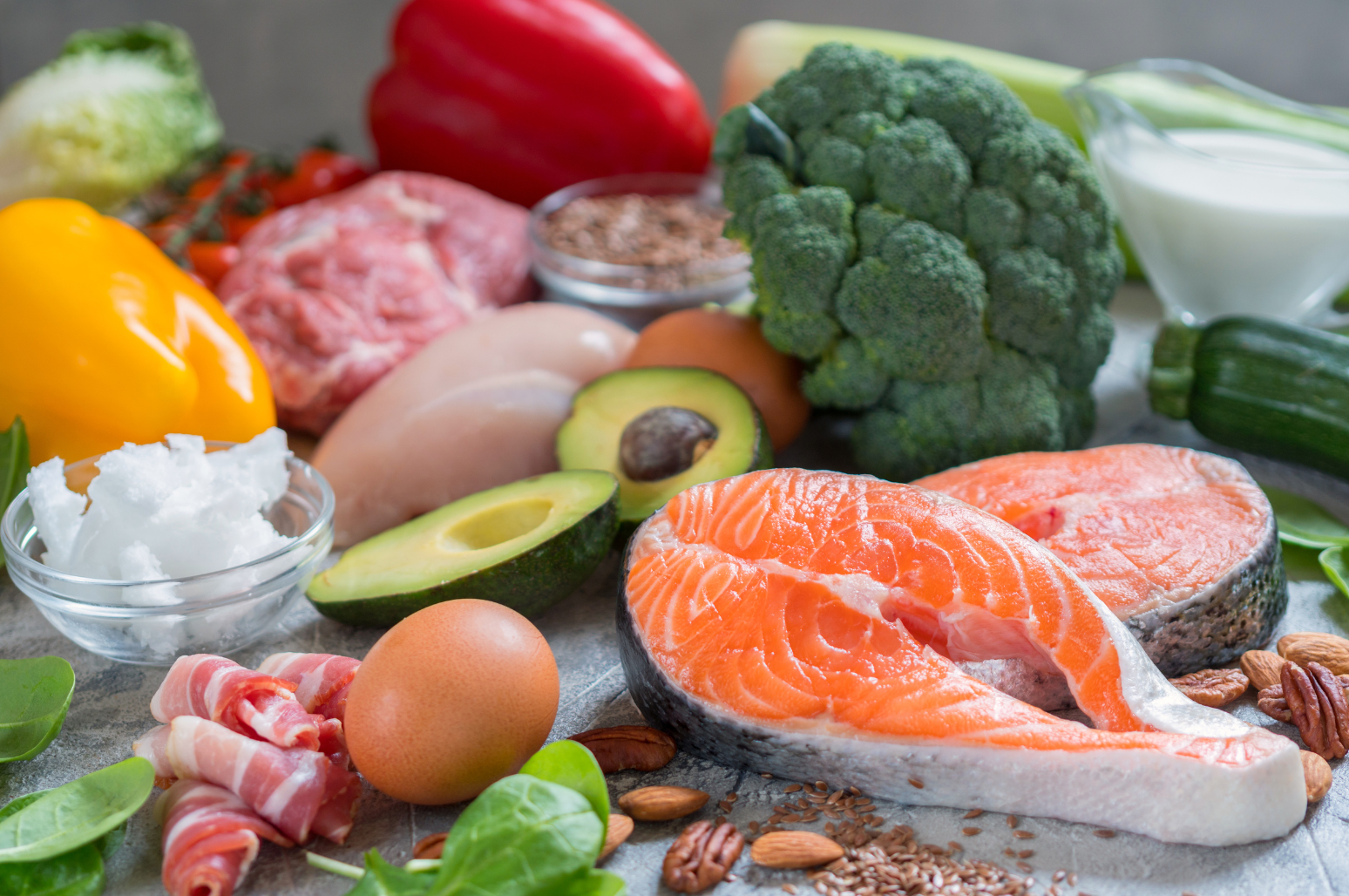
You’ve heard about the ketogenic diet and how it cuts down on carbs. You may have also heard about the carnivore diet, where humans begin eating more like lions and chowing down on meat, meat, meat. Both of these diets are skyrocketing in popularity, and they have similarities and differences. Let’s discuss keto vs. carnivore, and which one is right for you.
What Is Keto?
The ketogenic diet is more than just a high-fat, low-carb diet; it involves a state of metabolism called ketosis, in which your body switches from primarily burning sugar (glucose) for fuel to burning ketones produced by fat instead. When you aren’t shoveling in so much sugar, your body uses dietary fat from foods like avocado, olive oil, and fish as an alternative fuel source. This has been shown to be particularly beneficial for your brain, neurological conditions, inflammation, and more. Your liver produces advantageous ketone molecules that you can measure with a test, such as a urine strip test, to determine if you’re in the metabolic state of ketosis.
You simply can’t produce these wonderful ketones unless you drop your intake of carbohydrates, namely sugar and starch (chains of sugar molecules connected together). When you follow a ketogenic diet, your main goal is to enter the metabolic state of ketosis, which is typically achieved by lowering your intake of carbohydrates to below 50 grams daily. The category of carbohydrates includes sugar, fiber, and starch. Most people count net carbs, which means you’re only counting sugar and starch. You subtract the grams of fiber from your total carb count because fiber doesn’t spike your blood sugar in the same way and won’t kick you out of ketosis. In fact, fiber feeds the healthy bacteria in your gut.

In general, your macronutrient intake on a ketogenic diet should be around 70-80% fat, around 20% protein, and about 5% carbohydrate. The exact macronutrient percentages will vary depending on the individual. On keto, you consume a wide range of low-carb and low-starch plant and animal foods, such as avocado, leafy greens, cruciferous veggies, meats, seafood, nuts, and seeds. You can have certain fruits like berries in moderation.
You exclude sugary foods, refined grains, and grain-based products like wheat flour cupcakes, bread, and pasta, and starchy veggies like potatoes and corn. Read our detailed article for more info on what you can eat on keto.
Low carb and keto aren’t necessarily the same. You can drop your carbohydrates to around 90 grams daily, which is considerably lower than the standard American diet and could be called low carb, but it’s still too high to enter ketosis and begin producing ketones as fuel.
What Is Carnivore?
When you think carnivore, you might imagine a lion or a caveman running around with his javelin, but there’s a little more to it than that. The carnivore diet allows meat and animal products and avoids all other food sources, including veggies, nuts, grains, legumes, and fruits. With carnivore, you’re lowering your carb count pretty close to zero because animal products typically have little to zero carbs.
On carnivore, you consume:
- Meat
- Fish
- Eggs
You may transition into carnivore over time by slowly lowering the amount of greens and veggies you’re consuming. Some carnivore dieters consume small amounts of certain dairy products, such as goat cheese or kefir. If you go this route, it’s best to choose dairy products that are lower in lactose sugar. Your diet will be mapped around animal products like chicken, pork, bison, lamb, beef, organ meats, turkey, fish, and seafood. Many carnivore dieters also consume lard, butter, bone marrow, other animal fats, small amounts of hard cheese, and heavy cream.
Some carnivore dieters use seasonings and spices; others may occasionally indulge in coffee, tea, or a bite or two of dark chocolate. People follow carnivore more strictly if they’re using the diet to help with a medical condition, such as inflammatory autoimmune disease. Please read our detailed article for more info on what you can eat on a carnivore diet.
What’s the Difference Between Keto and Carnivore?
Both keto and carnivore are low-carb diets that ditch the unthinkable amount of sugar present in the modern Western diet. This is one of the reasons why both diets have shown promise in boosting metabolism and easing symptoms associated with a range of chronic health conditions. The main difference here is that the carnivore diet is predominantly fat and protein and closer to zero carb.

When you’re following a carnivore diet, you’re also in the metabolic state of ketosis because your carb count is so low, but you’re only eating animal products. Like carnivore, most keto diets encourage healthier whole foods as nature intended over processed and packaged keto treats. People on a carnivore diet aren’t usually concerned about macros or counting calories. The idea is to eat until you’re satiated and stick to animal products.
A key difference is that you can’t have any plants or other food categories on carnivore, whereas a standard ketogenic diet allows most food groups because the focus is on the carb count and reaching and maintaining ketosis rather than the food itself.
For many people, a carnivore diet is expensive and overly restrictive, but it can be a useful tool for improving some health conditions. As with every way of eating, some people do better on the carnivore diet than others; if you feel it might be for you, give it a try–and check out the carnivore recipes right here on our site.










Thank you for your insight. I hope you find healing. I am scared to try either diet because I don’t want to cause myself harm. I think I can do keto. Carnivore sounds a bit extreme. Many blessings.
Thank you for your article & insight Steph! I am beginning a Keto diet while living with my inlaws following spinal fusion surgery as my sister in law has had an AMAZING transformation in weight loss in Rx & in her arthritis all of which will benefit me also. We are watching YouTube videos about the subjects & I’m taking notes. When I return home I expect to follow Keto mainly. So Im indulging myself in info to continue to ketosis & it’s many benefits! Thanks & enjoy your days!